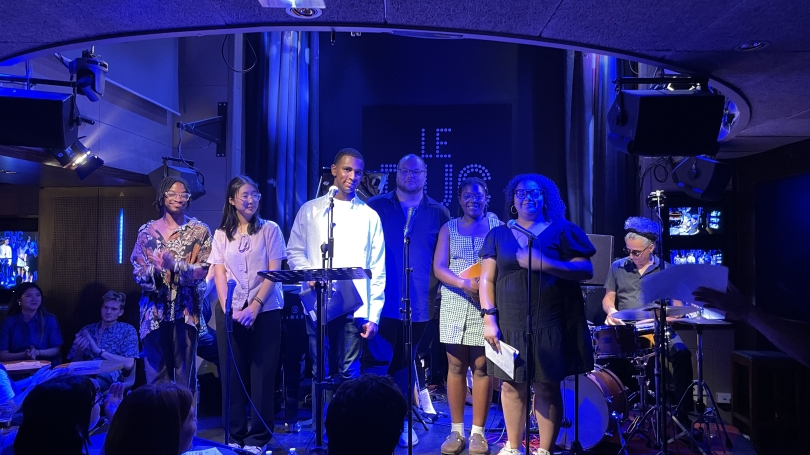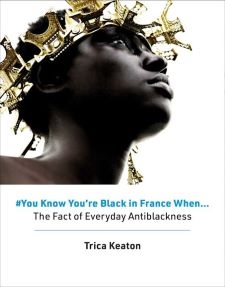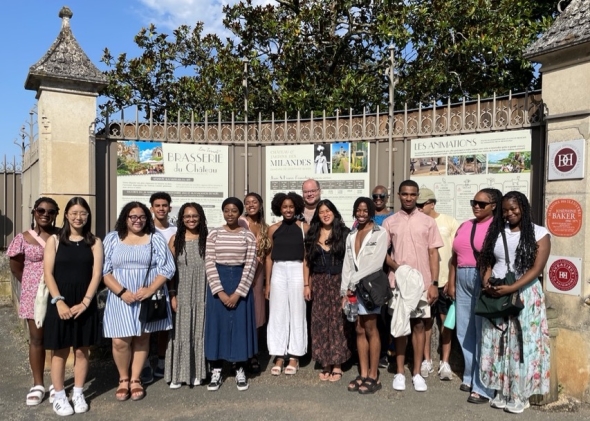

This summer's Afro/Black Paris Foreign Study Program enables students to take in the complex history, rich culture, and powerful struggles of Black French life.
It was early July, and Jared Pugh Jr. '25 was making his way to the stage at Le Duc des Lombards, a famous jazz club in central Paris, to deliver a powerful spoken-word performance. Pugh's performance, part of this summer's Afro/Black Paris Foreign Study Program jazz and poetry concert, was inspired by a talk his mother had with him following the deadly 2014 police shooting of Michael Brown in Ferguson, Mo.
The timing—and Pugh's words—couldn't have been more apt.
Just a week prior, French police had shot and killed 17-year-old Nahel Merzouk, a French citizen of Moroccan and Algerian descent, in the Paris suburb of Nanterre. The killing set off fresh rounds of race-related protests and heightened existing racial and political unrest in the City of Light.
"It was all too painfully familiar to my students, after having witnessed and lived these realities at home," says professor Trica Keaton, who created and directs the program.
The show at Le Duc was originally dedicated to the memory of two African-American expat jazz musicians, Rasul Siddik and Farris Smith Jr., but in the aftermath of Merzouk's death, it was also dedicated to him. Students took part in a one-day workshop at Le Duc where they learned the art of scat singing and spoken word composition and delivery from several professionals.
"I find myself reflecting on my perception of the protests, and of the police brutality that continues in France today, which I tried to grapple with through writing and performing spoken word," says Anne Rhee '25. "I am continuing to grapple with these issues today, and will continue to as I return back to campus in the fall."
The killing of Merzouk was also central to a discussion Keaton animated as part of a film series and a consortium on the study of Black life in France. "We screened Les Misérables which, along with my writings, lectures, and guest speakers, helped frame this tragedy for the students and a broader audience," Keaton says.
It is exactly this kind of experiential learning that defines Afro/Black Paris: The African Diaspora in the City of Light, which is offered by the Department of African and African American Studies through the Guarini Institute for International Education.
Keaton describes the program as "a journey through lived experiences," from colonization and slavery to contemporary issues in France.
"This program, my writings, and those of many others provided students with a context within which to locate these issues—and forums to express their thoughts and emotions about what they were experiencing in real time," she says.
Keaton created the program at the University of Minnesota, Twin Cities, and adapted it for Dartmouth in 2018, shortly after she joined the faculty. The program enables students to experience Black history and life in France through special excursions, workshops, and three courses: Afro/Black Paris: Past, Present, and Future; Decolonizing the French Museum: The Memory and Legacies of Black Enslavement; and Afro/Black Paris Through Language.
"Paris remains an important lieu de rencontre, or meeting place, for peoples of the African diaspora, including African Americans," Keaton explains, quoting scholar Brent Edwards: "(Paris) allowed boundary crossing, conversations, and collaborations that were available nowhere else to the same degree."
At the same time, the city continues to struggle deeply with its own racial issues. This struggle is explored in Keaton's program. For example, the government approach of colorblindness—in which public policies and procedures do not officially consider race—is "a myth and terribly flawed," Keaton explains.
Her recent book, #You Know You're Black in Paris When: The Fact of Everyday Antiblackness, which was longlisted for the 2023 American Library in Paris Book Award, shows how France perpetuates antiblackness in daily life even as it promotes "an ideology of blindness to race and/as color."
Keaton's own experience studying the history of French colonialism and the work of Black French statesmen, intellectuals, and artists not only underlines how problematic this approach is, but also "profoundly heightened and broadened" her understanding of the location of Black Americans in the African diaspora and the significance of the African diaspora in France, she says.
She wanted to offer her students the same opportunity.
"I had been aware of France's 'colorblind' approach towards the topic of race, so I was intrigued by the program's new approach to understanding Paris—and France—through examining the Black diaspora and communities that live there," Rhee says. "Moreover, my previous studies in race, history, and sociology had all been taught through a U.S.-centric lens. I wanted to be able to expand my own understanding of racial identity through the lens of another country."

Students in the FSP travel to the Dordogne region and Le Château des Milandes to study the life and times of Josephine Baker, as well as to Nantes to explore how a city prospered from the Atlantic slave trade and addresses its abolition. Through walking tours and other activities, students learn about the advent of Black American jazz in Paris and study hip hop as a symbol of refusing oppression and expressing joy in tension with pain and injustices.
"Any space can potentially be a classroom," Keaton says. "I want students to experience another Paris, indeed another France—the African diaspora in the City of Light, the good, the bad, and the ugly; to appreciate how and why diverse Black people came to be in Paris; their struggles and understudied contributions; and why Paris and France are both a loved and a contested home."